There are few demographics more underrepresented in Buffy the Vampire Slayer than Adult Female Characters. As a coming-of-age story, the bulk of Buffy’s cast is understandably made up of Adolescents, who carry on their stories as Young Adults as the show moves on past high school. Beyond these characters though, the show finds time and space to develop many beloved Adult Male Characters. Giles is the first obvious example, but Angel and Spike both also add to this roster, as does Robin Wood in the show’s final season. These are major characters afforded a lot of focus and narrative perspective. Our list of Adult Women on the other hand extends as far as the late Jenny Calendar – a character with a personality and hastily-constructed backstory that could charitably be described as “fascinating”, and uncharitably as “messy” – and Joyce Summers.
Joyce comes into an interesting position this season. She has been a part of the show since the beginning, but the first two seasons positioned her primarily as an obstacle for Buffy, whose ignorance of the supernatural kept her firmly external to the narrative. She is pointedly absent from much of Season Four, and while she gets a lot of screentime with her illness and eventual death in Season Five, it is not her struggles that the show is interested in, only how those struggles are affecting Buffy. Her position is always that of the archetypical Mother. The nagging, obstructive force of Seasons One and Two, the voiceless absence of Season Four, and the sanctified near-Madonna figure that she becomes in Season Five and then posthumously. These comprise nearly all the roles ever afforded to the most thankless of narrative roles – the Hero’s Mother. The Mother can be a nuisance, unmentioned, or tragically dead, but very rarely are they permitted to be a person.
So Season Three is an important season for Joyce, as this is the only season in which she can be seen as an actual person – a minor character for sure, but a character with her own internality, and own arc. Since discovering Buffy’s secret identity and the supernatural world at the end of Season Two – and reacting more or less as poorly as she possibly could – her arc this season deals with her coming to terms with her daughter’s identity, attempting to cohere it to her worldview, and eventually accepting it. By the season’s end, she will not be naively attempting to call the police, but will trust in Buffy’s strength and maturity to deal with her latest apocalypse.
This is one of the few episodes, even within this season, that allows us to understand Joyce as a person, and it does this by showing us who she is outside of the role of Mother. This is Joyce at seventeen, and though she still possesses all the memories of her adulthood, she clearly has the personality of her teenage self, with marriage and motherhood fading away in her memory as, in her own words, in a dream. Here we finally see the real Joyce – or at least, a real facet of her.
The Joyce we see here has many notable qualities. She is somewhat impulsive – readily handing over her car keys to an unqualified Buffy. She is rebellious, though in a safe, teenage way that extends in its extremes to a little weed and petty theft. She is easily impressed, and eager to impress others. She tries to show off to ‘Ripper’ – proudly bragging of her ability to order pay-per-view, and exclaiming how “cool” and “brave” his teenage antics are. She’s somewhat image-conscious, being visibly embarrassed at her own “geeky” vehicle. She has no time for Snyder and his desperate lack of charm. She has a tender side, and expresses it obviously when she learns about the babies in danger. Like her daughter, she clearly has a thing for “bad boys”. Unlike her daughter, she is more follower than leader, conforming her opinions to the boy she’s trying to impress and more eager to go along with what he suggests than suggest anything herself.
All these aspects cohere into a single consistent character – which I must stress, is not a given for adult women in this series. Even as someone who has struggled at times with Joyce’s character, she is genuinely endearing here, as we glimpse into a more complete understanding of who Joyce is as a person beyond “Buffy’s Mom”. And while it is a good thing within itself to learn more about characters in a show, it is indicative of the show’s general attitude towards older women that the only time Joyce is allowed this much internality is when she is magically returned to the mindset of a seventeen year old. The show is still being told from the POV of a teenager. Naturally, its sympathies lie with the teenage perspective, and the teenage perspective allows such little room for seeing parents as people. However, there is a less forgivable explanation for why the show has plenty of time for adult men, but struggles so often when it comes to writing older women.
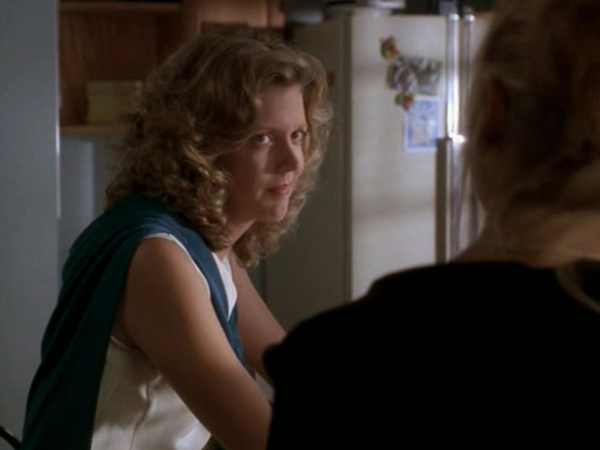
Now we must turn to Joyce’s counterpart for this episode, and Buffy’s other parental figure, Rupert “Ripper” Giles. Though “adopted father” would be an incomplete description of Giles’ relationship to Buffy, it’s not a wholly inaccurate one, and few episodes set him in this role more clearly than Band Candy. The opening act of the episode parallels Joyce and Giles, both in the obvious way that they are dual authority figures dictating Buffy’s schedule, and in slightly subtler ways, like how they are both sweet-talked by Buffy into buying exactly twenty candy bars apiece. They are positioned as co-parents to Buffy, managing her and being rebelled against by her in equal measure.
The backstory already provided for Giles in Halloween and The Dark Age establishes Giles’ motivations for his ambivalent autocracy towards Buffy. He too had a destiny thrust upon him too young, and he too tried to avoid it, throwing himself into a series of rebellions that led to the deaths of his friends. This traumatic experience shaped him into the Rupert Giles we know now – the tweed-clad librarian shorn of sharp edges, who has molded himself into a patriarchal role in relation to Buffy, so he can stop her from making similar mistakes.
But Ripper emerges here in all his punkish glory, showing himself to be as much a real part of Giles as this Joyce is the “real” Joyce. Ripper is Giles’ own Shadow Self, not incorporated into his consciousness but hidden, beneath the tweed, taking only a little magical prod to emerge and take over his entire personality. This episode is the most we ever see of Ripper, and as rip-roaringly entertaining as it is to see Anthony Stewart Head in this mode (his goading of Buffy to punch Ethan and yelp of cheer when she does so remains a real highlight), it is to the show’s benefit that ‘Ripper’ is seen only sparingly, as it increases the impact when Giles does invoke his darker side.
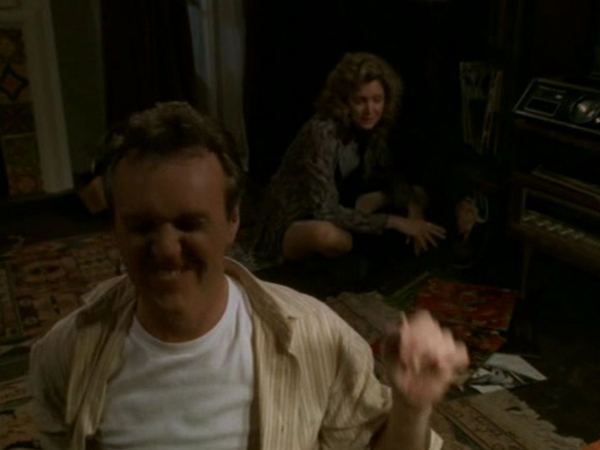
This is one of the last times we see Giles in such an overbearingly autocratic mode. It was a major element of his and Buffy’s relationship in the first two seasons, with many episodes featuring him trying to insist on a Right and Correct way to be a Slayer, Buffy challenging that and shaping her own identity. We have seen this less and less as the series has progressed, and their relationship will continue to develop in this pattern through until Season Four, in which Giles will swing the other way and become as hands-off in his “parenting” as he can be. Giles’ arc in Season Three is not dissimilar to Joyce’s, as he becomes less of an obstacle to Buffy and more of a partner, stops micro-managing her, allows her full control of her own destiny and follows her lead in her plan to stop the Mayor. It is of significance that this plan hinges on him blowing up the library – an obvious symbol of the non-Ripper parts of Giles.
Both Joyce and Giles are in early parts of these arcs, and in this episode are most set in their “parent knows best” phase. This is not a worthless perspective. As adults, they have knowledge and experiences that Buffy does not, as well as simple developmental maturity. They are not being obstinate for no reason – they both want the best for Buffy and are shown to not be entirely wrong to distrust her supposed maturity. The episode makes a point to remind us that Buffy ran away from home, and how she is currently keeping her ex-boyfriend hidden (an act that the next episode will point out is an active betrayal of Giles).
Moreover, we are reminded of Buffy’s similarity to the immature versions of both her “parents”. Her parallels with Ripper were well established in The Dark Age, as young people trying to escape expectations forced upon them too young. Here, the episode calls forward to Bad Girls. The actions of Ripper and Joyce in this episode – going out on the town, smashing shop windows, committing petty theft, getting caught by police before beating up said police officers – are the exact same actions committed by Faith and Buffy in Bad Girls. This puts Faith in the position of Ripper (the more impulsive, actively hedonistic member of the pair), and Buffy in the role of her Joyce, looking on with girlish admiration. Though Buffy and Faith do not get up to the same actions that Giles and Joyce do on the hood of a police car, the implied use of handcuffs by the pair lends a sexual connotation to the item that is significant when we consider their usage in Bad Girls, Enemies and Graduation Day, as well Buffy’s use of them on Angel earlier in the season.
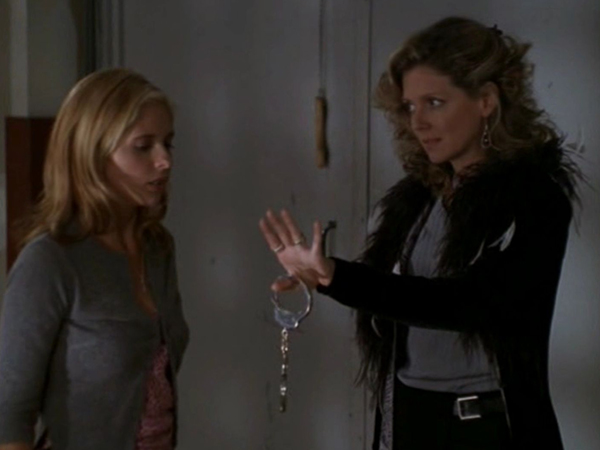
Another episode with parallels of significance is Surprise. Both episodes feature an early scene between Joyce and Buffy in the Summers kitchen, where Buffy expresses her wish to start driving, while Joyce is reluctant. In Surprise, this is used as a metaphor for Buffy’s virginity – the prophesied “Do you really think you’re ready” line along with the smashed plate making this clear. This metaphor can easily be carried on to Band Candy, with Buffy’s insistence that she is prepared and has “watched the filmstrips with the blood and the corpses” viewed as a reference to how her experiences with Angel have prepared her for any negative consequences of sex (indeed, she’d struggle to find any more negative). Joyce specifically cites the outcome of that experience (Buffy running away from home) as a reason she should not be driving.
We do see Buffy’s driving skills in this episode, and it is fair evidence that Joyce is right not to let Buffy drive. This, as well as the subtle callback to Giles’ seemingly pointless lesson about learning to identify her opponent’s location while blinded, when Buffy uses this exact technique to find Ethan’s hiding place in the climax, is a reminder that Buffy still has plenty to learn, and is not as ready for adult life as she might believe.
This seems to be the intended lesson of the episode. Buffy is not as ready as she thinks she is. Seventeen year olds often think of themselves as mature and as put-together as adults, but this self-perception does not match up to reality. It’s a common lesson for teenage coming-of-age stories, and is one that is fairly true to life. I think anyone over the age of 17 will find it fairly easy to look back at themselves at that age and realise that, no matter how much they knew, they didn’t know half as much as they do now, and not a tenth as much as they thought they did. However, Buffy the Vampire Slayer is not reality, and the episode tips its hand to this through one significant line of Willow’s.
“They’re acting like a bunch of us.”
Buffy Summers and Willow Rosenberg, 3×06 Band Candy
“…I don’t act like this.”
Willow’s defensiveness in this line is played as a joke, but the problem the show has is that it is also demonstrably true. The adults that Buffy says are acting “like us” are not, in fact, acting like the protagonists of this teenage coming-of-age story. They are acting like a parody of immaturity and extreme hedonism, while Willow is a fairly responsible and intelligent person, who does not act like that. Child protagonists – which is what Buffy and Willow are at this point – are always going to be mature and smart beyond their years, because the genre demands that of them. These stories would not function as stories if the people within them realistically acted their age.
This is as true for Buffy as it is for Willow. She has experiences that her ‘parents’ simply do not. She has experienced traumas and taken on responsibilities that most people do not get near in their entire adult life (as is natural for a supernatural teen coming-of-age protagonist). She is more mature than any of the candy-drunk adults in this episode – demonstrated when she has to snap Ripper, Joyce and Snyder into useful action, and takes responsible charge of the situation. Given that both Joyce and the show seem to have forgotten Joyce’s complicitly in Buffy’s ‘irresponsible’ choice to leave home, there is a fair argument to be made that Buffy is more mature than any of the regular adults on this show.
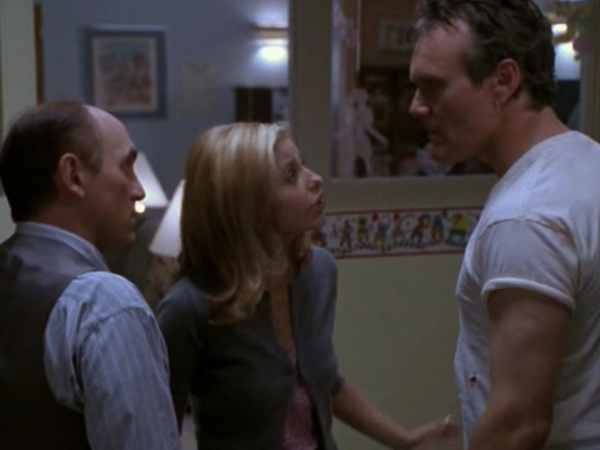
This is not because of any special ability of Buffy – it’s simply a natural effect of the structure of this genre. This is a teen drama, and it is interested in the teen perspective. The teen perspective is one that sees teenagers as intelligent and responsible, and adults as obstinate and out of touch. How untrue this might be in reality varies massively depending on context, but the important thing is that it is true within the fiction of Buffy the Vampire Slayer. The show’s investment in the teenage perspective is powerful, and is part of what makes it such a formative show for so many people, but it is this same perspective that skews its own lesson. Buffy wants to tell the classic coming-of-age “be careful what you wish for” story about responsibility, but undermines itself because, ultimately, it is too good at being a coming-of-age story.
It is this commitment to the teenage perspective that allows Buffy, and the other female characters of her age, to escape the fate of Joyce. The show does not always allow Joyce to be a consistent character with depth because the fantasy coming-of-age genre needs authority figures to either be obstinate, out-of-touch, absent, or dead – and so that is what she is. This is the space where misogyny meets the honest needs of the genre. Neither aspect fully explains why Joyce is written the way that she is; they have to be considered in tandem. It’s a knotty issue that deserves to be seen this way. But at least the show’s commitment to the teenage perspective allows us to see the complex internal lives of its younger women – of Buffy, of Willow, of Cordelia, Faith, and, for fractions of this episode, of Joyce Summers too.
* * *
Thanks for reading! If you enjoyed this piece, please consider supporting me on Ko-Fi!
* * *
Thank you to juanabaloo on Tumblr for her help proof-reading this essay.
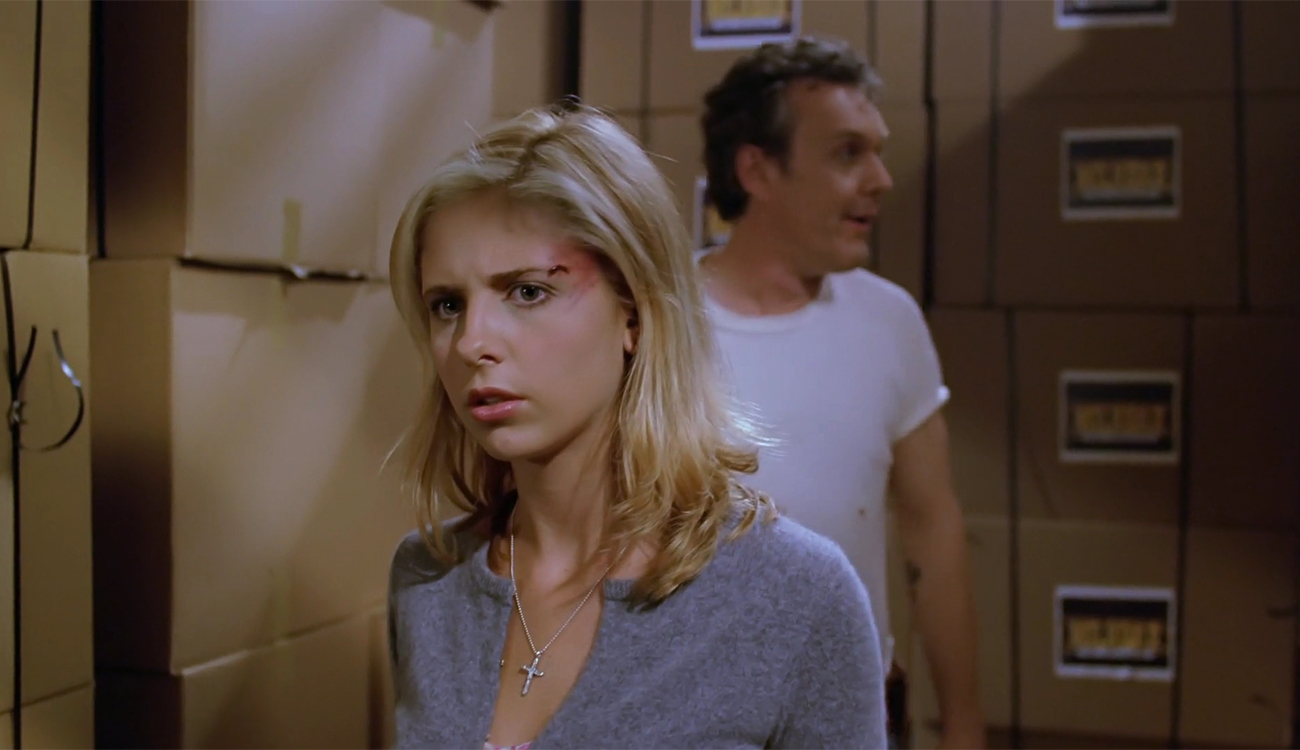
I love this; it’s yet another of your thoughtful, analytical essays. Many less-observant fen quite probably perceive only the comedy inherent in this episode. Me, I have a different view; I see it as one of the many episodes of Buffy (and of A:ts) that actually function as serious social comedy. To me, the theme of “Band Candy” is as chilling as it is true in the real world: When adults act like teens, babies die.
LikeLike
Of course, I meant to type “serious social commentary” (not serious social comedy)
LikeLike